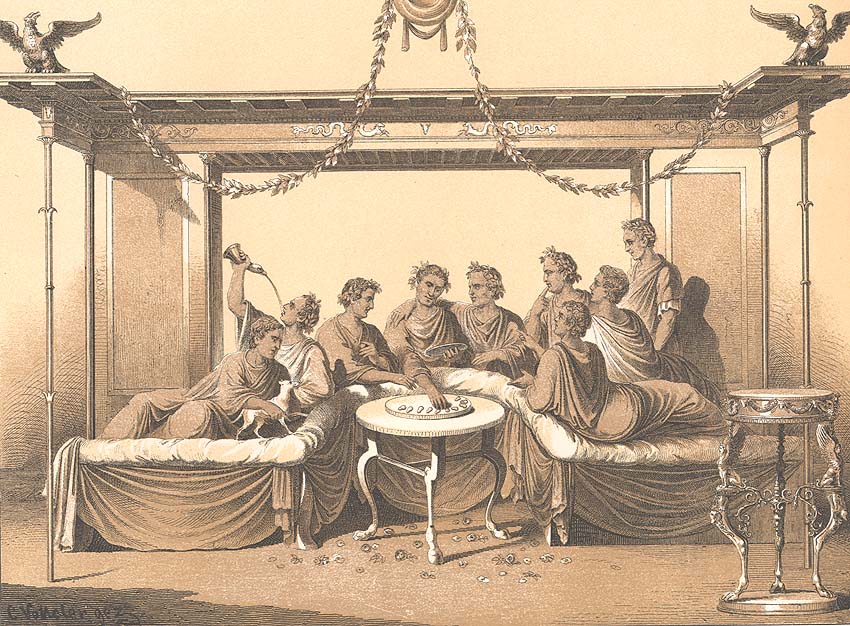Julian Augustus
After the victories described, I went into winter quarters at a pleasant town called Sens whose particular virtue was that it kept me at a proper distance from Florentius at Vienne and Marcellus at Rheims.
During those months Helena kept much to herself. She had several ladies with her from the court at Milan and I think that she was reasonably content, though she was not in good health: because of her age, the birth had been a difficult one. I was always ill at ease with Helena. I could hardly forget that she was the sister of my enemy. For a long time I was uncertain to which of us she was loyal. I do know that she kept up a considerable correspondence with her brother (since destroyed; by whom? very mysterious); as a result, I was careful to say nothing in her presence which might make Constantius suspicious. This self-restraint was a considerable burden for me.
Only once did Helena reveal that she had some idea of what was in my mind and heart. It was in December. We had dined frugally in my office, which was easier to heat than the state apartments. Several braziers gave forth sufficient heat—at least for me; Priscus used to complain bitterly of my meanness in this regard. Helena sat with her ladies at the opposite end of the room, listening to one of the women sing Greek songs, while Oribasius, Sallust, Priscus and I reclined on couches at the other end of the room.
 We spoke idly at first, as one does after supper. We touched on the military situation. It was not good. Despite my victory at Cologne, Florentius had left me with only two legions. The rest of my army had been recalled to Rheims and Vienne. I was in the same position I had been my first winter at Vienne, a prince with no principality. Only now I carried a larger burden. But as the old saying goes, “A pack-saddle is put on an ox; that is surely no burden for me.” It was my task not only to hold Sens but to protect the neighbouring villages from the German tribes who were, even in the dead of winter, moving restlessly from town to town, burning and pillaging. In fact, Chnodomar himself had sworn that he would hang me before the spring thaw. To garrison the near-by towns, I was obliged to give up two-thirds of the soldiers under my command. Added to this, we were faced with an unusual number of desertions, especially among the Italian soldiers.
We spoke idly at first, as one does after supper. We touched on the military situation. It was not good. Despite my victory at Cologne, Florentius had left me with only two legions. The rest of my army had been recalled to Rheims and Vienne. I was in the same position I had been my first winter at Vienne, a prince with no principality. Only now I carried a larger burden. But as the old saying goes, “A pack-saddle is put on an ox; that is surely no burden for me.” It was my task not only to hold Sens but to protect the neighbouring villages from the German tribes who were, even in the dead of winter, moving restlessly from town to town, burning and pillaging. In fact, Chnodomar himself had sworn that he would hang me before the spring thaw. To garrison the near-by towns, I was obliged to give up two-thirds of the soldiers under my command. Added to this, we were faced with an unusual number of desertions, especially among the Italian soldiers.
“Any man who deserts should be executed,” said Sallust, “publicly, before the legions.”
“It is remarkably difficult, General,” said Priscus in his sly way, “to execute a deserter. First, you must catch him.”
“The only solution,” I said, “is victory. If we are successful, the men will be loyal. There are few deserters in a winning army.”
“But we are neither winning nor an army,” said Priscus with unpleasant accuracy.
“Which is exactly what the Emperor wants.” Oribasius spoke too loudly. I silenced him with a gesture. Helena had heard this but she made no sign.
“I am sure the divine Emperor, my cousin and colleague, is eager for us to succeed in driving the Germans from Gaul.” Actually, I had received no word from Constantius since taking up residence at Sens. I assumed that he was angry with me for not returning to Vienne.
Then Priscus asked me to read from the panegyric I was writing on Eusebia. I sent for a notary, who brought me the manuscript. I read a few pages, not liking it at all. The work was rough. I said so.
“Probably,” said the wicked Priscus, “because it is nearly sincere.”
The others laughed. At Vienne I had written a lengthy panegyric of Constantius which—if I say so myself—was a masterpiece, carefully ordered and beautifully composed. The art of panegyric does not necessarily exclude honesty, though one’s true feelings are perfectly irrelevant to the final composition, which is artifice, not truth. Even Constantius realized that I had created something marvellous and wrote me a letter in his own hand, filled with misspellings and errors of syntax. I then tried to write a panegyric on Eusebia, and found it difficult; no doubt, as Priscus suggested, because of my true regard for the subject. Also, I was honour bound not to reveal to what extent she had saved my life. This was limiting.